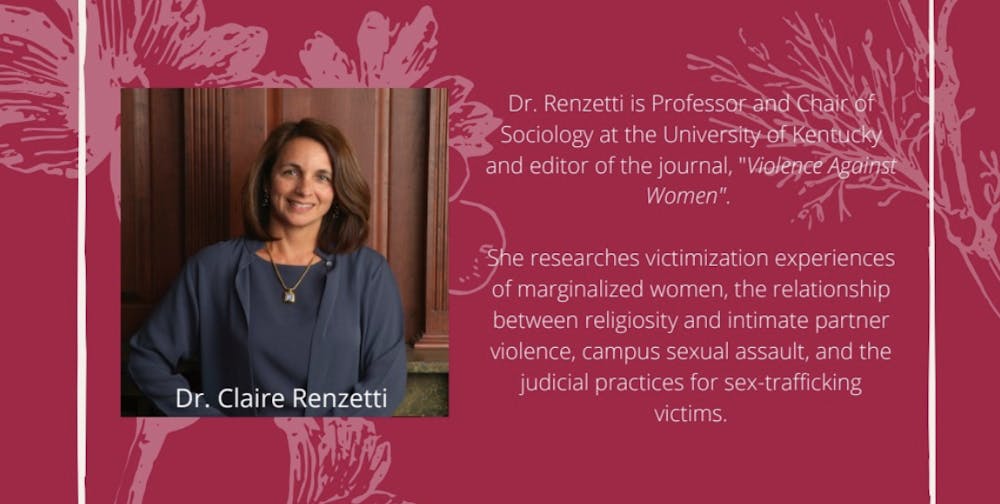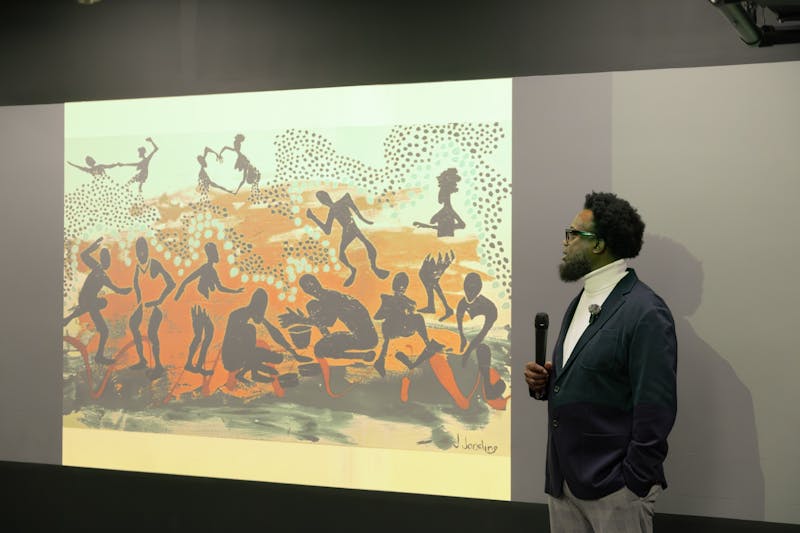On March 24, students from a variety of majors joined Kean's Women and Gender Studies Program, in partnership with the Center for Interdisciplinary Studies, College of Liberal Arts and the Office of Diversity, Equity and Inclusion, to welcome guest speaker Dr. Claire Renzetti to present her research on sexual assault and a college students perception.
Dr. Sara Compion, the department administrator for the Center for Interdisciplinary Studies, opened up the event by welcoming and thanking all the students and staff that joined.
Knowing that topics covered in this lecture could be discomforting to some listeners, the presenters introduced the Managing Assistant Director of the Kean Counseling Center Mei Ling, a counselor that was available to speak with students during this event.
Dr. Consuelo Bonillas, professor in the College of Education and the Women's and Gender Studies program coordinator, introduces Dr. Claire Renzetti and gives her center stage to present her research titled, "Student's Perceptions of Justice in Campus Sexual Assault Cases."
The presentation begins with a discussion on what constitutes a "real" sexual assault. Renzetti speaks on rape myths and how it affects the way the criminal justice system deals with sexual assault cases. She differentiates between these myths and the truths but makes sure to remind the audience that many sexual assault victims may sometimes subscribe to the myths.
She goes on to acknowledge the hard work of colleges and universities in building programs and developing services to help prevent sexual assault. Due to these campus prevention efforts, rape myth acceptance has decreased but incidents of sexual assault do not show a corresponding decrease.
In hopes to provide more research on these topics, Renzetti conducts a study to try and figure out student's perceptions of justice in campus sexual assault cases.
Her study consisted of 845 participants of both male and female college students ranging from ages 19 to 48 in varying undergraduate level and race/ethnicity.
Four versions each with eight vignettes, Renzetti was able to create scenarios in which participants of the study had to rate whether they agreed with the punishment given to the perpetrator for the act they committed. Each vignette was controlled for race/ethnic bias, the general context of assault and the relationship of perpetrator and victim.
Although all 14 factors of the research are important to the discussion, Renzetti focused on the following five and gave the audience more insight into these particular findings.
Degree of Certainty
Findings show that when victims and accused accounts are different, participants showed greater sympathy for the accused. The accused was seen as less guilty and held less responsibility.
Reason for Victim Incapacitation
This factor showed victims who were slipped extra drinks or who drank voluntarily were assigned more guilt and bore more responsibility for the assault.
Perceived Sexual Interest of the Victim
It is revealed that victims with high sexual interest were more guilty and the perpetrators who attacked them received less of a punishment. It is the opposite with victims with low interest and offenders who attacked them received a higher punishment.
Assault Perpetrated by Fraternity Member
Frat members were perceived as being more guilty than someone with no frat involvement.
Type of Forced Sex
Punishments ranged in perceived seriousness for all four types of forced sex. With all four, the perpetrator was seen to bear most if not all the guilt.
Sex of Perpetrator
Findings demonstrated that female perpetrators were treated more leniently than male perpetrators.
The presentation ended with Renzetti stating her researches implications. She mentions how prevention programs need more detailed and specific information and that there is still a significant gap in knowledge around LGBTQ+ students, students with disabilities and international students.
The floor was then opened up for any questions. Conversations sparked between audience members on topics ranging from attitudes towards sex education to how one can help others who are experiencing relationship violence.
If students missed out on this lecture and want to see more, they can keep an eye on the Women and Gender Studies Programs, the Center for Interdisciplinary Studies, College of Liberal Arts and Office of Diversity, Equity and Inclusion on their respective Cougar Links for any upcoming events and lectures.






